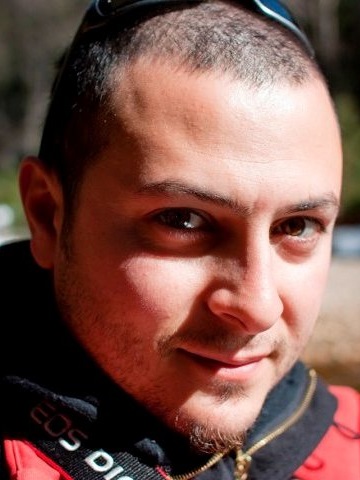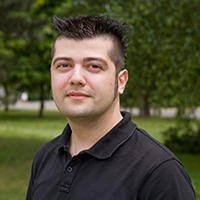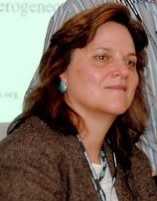Keynotes
- Dr. Paolo Braca. Multi-domain situational awareness: From the underwater to the space domain to improve maritime surveillance
- Prof. Raffaele Gravina. Multi-User Activity Recognition: State-of-the-art and Research Challenges
- Dr. Bartlett Russell. Engineering Virtuous AI: DevEthOps for achieving responsible human oversight of AI-enabled systems
- Dr. Jean Botev and Dr. Kirstie Bellman. A Dialogue on Socio-Technical Systems and Situation Awareness
Keynote: Multi-domain situational awareness: From the underwater to the space domain to improve maritime surveillance
Time: Monday, 6th June, 16:30-17:45 (UTC+2)Dr. Paolo Braca
Abstract: Modern surveillance systems require to integrate coherently all available sources of information to compose an operational picture that is as complete as possible. While in the past surveillance had suffered from a lack of data, current technology transformed the problem into one of an overabundance of information, leading to an extreme need for automated analysis. Indeed, current surveillance sensors generate volumes of data that would have been unthinkable only a few years ago. Therefore, all the processing, algorithm calibration, parameter tuning, etc., need to be executed as much automatically as possible.
This also requires novel paradigms for algorithmic design. In this respect, Artificial Intelligence (AI) and Data Fusion (DF) offer an unprecedented opportunity to strengthen the technological edge; however, the risk is to elevate, at the same time, the speed of the threats we face. Indeed, the surveillance task is complicated by the diversification of threats, whose nature and origin is most often unknown. AI and DF techniques have the potential to identify patterns emerging within these very large datasets, fused from a variety of sources and generated from monitoring wide areas on a day-to-day basis, and use the learned knowledge to anticipate the possible evolution(s) of the operational picture.
The presentation will focus on both real-world scenarios and theoretical models, spanning from the underwater to the space domain, including the analysis of scenarios with heterogeneous surveillance sensors (such as radar, sonar and satellite). Finally, the opportunity will be taken to present a brief overview of the transitioning of some of these techniques for COVID-19 epidemiological curve monitoring and forecasting.

Bio: Paolo Braca (Senior Member, IEEE) received the Laurea degree (summa cum laude) in electronic engineering and the Ph.D. degree (Hons.) in information engineering from the University of Salerno, Italy, in 2006 and 2010, respectively. In 2009, he was a Visiting Scholar with the ECE Department, University of Connecticut. From 2010 to 2011, he was a Postdoctoral Associate with the University of Salerno. In 2011, he joined the NATO Science and Technology Organization (STO) Centre for Maritime Research and Experimentation (CMRE), where he is currently a Senior Scientist and a Project Manager. Furthermore, he led a number of research projects funded by the European Commission, by the U.S. Office of Naval Research (ONR), and other national and international institutions. He conducts research in the general area of machine learning and statistical signal processing with emphasis on detection and estimation theory, wireless sensor network, multi-agent algorithms, target tracking and data fusion, adaptation and learning over graphs, radar (sonar) signal processing, and machine learning. He has coauthored more than 200 publications in international scientific journals, conference proceedings, and NATO technical reports. He was awarded with the National Scientific Qualification to function as Associate and Full Professor in Italian Universities, in 2017 and 2018, respectively. . In 2019, he was appointed as Adjunct Professor with the University of Cassino, Italy. He is in the technical committee of the major international conferences in the field of signal processing and data fusion. He was a recipient of the Best Student Paper Award (first runner-up) at FUSION conference in 2009, and the NATO Science and Technology Organization (STO) Scientific Achievement Award (SAA) 2017 for its contribution to the ‘‘Development and Demonstration of Networked Autonomous ASW’’. He coauthored the paper received the Best Paper Award (first runner-up) at the SSPD conference in 2019. He received the IET 2019 Premium Award for Best Paper published on the IET Radar Sonar & Navigation. He was also a recipient of the NATO STO SAA, in 2020, as a Team Leader for the ‘‘Advances in Artificial Intelligence and Information Fusion for Maritime Situational Awareness.’’ He coauthored the article receiving the Young Scientist Contest Award at the Signal Processing Symposium 2021. He serves as Associate Editor for the IEEE Transactions on Aerospace and Electronic Systems, ISIF Journal of Advances in Information Fusion, and IET Radar, Sonar and Navigation. In 2017, he was a Lead Guest Editor of the Special Issue ‘‘Sonar Multi-Sensor Applications and Techniques’’ in IET Radar, Sonar and Navigation. He served as Associate Editor for the IEEE Signal Processing Magazine, IEEE Transactions on Signal Processing, and EURASIP Journal Advances on Signal Processing.
Keynote: Multi-User Activity Recognition: State-of-the-art and Research Challenges
Time: Tuesday, June 7th, 16:30-17:45 (UTC+2)Prof. Raffaele Gravina
Abstract: Human activity recognition has attracted enormous research interest because it provides precious contextual information in several domains spanning from health-care to security, safety, and entertainment. So far, robust and consolidated literature focused on the automatic detection of activities performed by single individuals, with a great variety of approaches in terms of sensing modalities, recognition techniques, specific set of recognized activities, and final application objectives. However, much less research attention has been devoted to scenarios in which multiple subjects perform individual or joint activities forming groups to achieve common goals. This problem is often referred as multi-user activity recognition. With the advent of the Internet-of-Things, smart objects are being pervasively spread in the environment and worn on the human body, enabling contextual and distributed recognition of group and multi-user activities. This talk discusses the motivations and advantages of multi-user activity recognition and overviews sensing methods (including those based on Wearable Computing Systems and in particular Collaborative Body Sensor Networks, developed in the context of the SPINE Body-of-Knowledge), recognition approaches, and impact in practical, relevant applications. The multi-user activity recognition approaches are also analyzed from the perspective of situation-aware systems. In particular, an emerging trend analyzed during the talk is the definition of collaborative situation-aware wearable computing systems, i.e., wearable devices able to perceive and understand the situation in order to adapt their behavior and anticipate user’s needs. The discussion also outlines important open research challenges and related future directions.

Bio: Raffaele Gravina (http://labs.dimes.unical.it/speme/people/raffaele-gravina) received his Master Degree in Computer Science and a PhD Degree in Computer and Systems Engineering from the University of Calabria, Italy, respectively in 2007 and 2012. In 2007 he spent six months with an under-graduate training program at the Wireless Sensor Networks Lab in Berkeley, California. Between 2008 and 2010 he was employed as researcher at the same Lab with focus on the development of domain-specific frameworks for Wireless Body Sensor Networks (BSNs).
Since 2016, he is Tenured Assistant Professor of Computer Engineering (ING-INF/05) at the Department of Informatics, Modeling, Electronics, and Systems Engineering of the University of Calabria. Since 2020, he has the Italian ASN (Scientific National Habilitation) for Full Professor.
He is young foreign visiting scientist at the Shenzhen Institutes of Advanced Technology, Chinese Academy of Sciences. He is co-founder and CTO of health-care sector at SenSysCal S.r.l., a spin-off of the University of Calabria, which develops innovative Internet-of-Things and sensor-based systems for e-health and building monitoring.
His research activities include high-level programming methodologies and frameworks for BSNs, Collaborative BSN, BSN-Cloud integration, pattern recognition and machine learning algorithms on physiological signals, human activity and body language recognition, motor rehabilitation assistance based on wearable sensors, ECG analysis for cardiac monitoring and emotion detection, and Internet-of-Things modeling and simulation techniques.
As of June 2022, he authored more than 90 indexed international publications (including over 25 papers in journals ranked Q1 by Scimago and one authored book), with 4400+ citations on Google Scholar (3100+ on SCOPUS) and an H-index equal to 31 (27 on SCOPUS).
In 2020, he received the Editorial Award of Smart Health (Elsevier), for demonstrating editorial excellence. In 2014, he received the prestigious Andrew P. Sage Best Transactions Paper, for the publication: G. Fortino, R. Giannantonio, R. Gravina, P. Kuryloski, R. Jafari, “Enabling Effective Programming and Flexible Management of Efficient Body Sensor Network Applications”, IEEE Transactions on Human-Machine Systems, 43(1), pp. 115-133, 2013.
He is member of the Editorial Board of Information Fusion, Associated Editor of Smart Health and Associate Editor of Sensors. He is associate member of the Technical Committee on Wearable Biomedical Sensors and Systems. He is member of IEEE, IEEE Young Professionals Italy Section, and IEEE SMC Society.
He has been involved in national and international research projects with various roles, including Principal Investigator. He is also member of the Joint Italy/China Project “Smart Personal Mobility Systems for Human Disabilities in Future Smart Cities”. In this context, on November 2015 he was visiting researcher at the Wuhan University of Technology in the IoT Lab coordinated by Prof. Wenfeng Li.
Keynote: Engineering Virtuous AI: DevEthOps for achieving responsible human oversight of AI-enabled systems
Time: Wednesday, June 8th, 16:30-17:45 (UTC+2)Dr. Bartlett Russell
Abstract: Dr. Russell will discuss challenges and opportunities regarding the responsible human oversight and operation of autonomous systems in Defense contexts. Her talk will step through examples of concrete, empirical progress towards making the development of legally, morally, and ethically (LME) compliant autonomous and AI-enabled systems. This talk will provide evidence that challenges commonly held assumptions about the capacity of autonomous and AI-enabled systems to extend a human operator’s capacity to act virtuously, will detail the benefits of making LME considerations part of the entire system-development cycle, and will from a cognitive perspective define some of the remaining research challenges that currently limit responsible human oversight of such systems.

Bio: Dr. Bartlett Russell joined DARPA as a program manager in April of 2019. Her work focuses on understanding the variability of human cognitive and social behavior to enable the decision-maker, improve analytics, and generate autonomous and AI systems that enable human adaptability. She manages programs in both the Defense Sciences Office (DSO) and Tactical Technologies Office (TTO) including Habitus, Enhancing Design for Graceful Extensibility (EDGE), Urban Reconnaissance through Supervised Autonomy (URSA), Virtuous AI, and Non-Escalatory Engagement to reduce Dimensionality (NEED) programs. Prior to joining DARPA, Russell was a senior program manager and lead of the Human Systems and Autonomy research area in Lockheed Martin’s Advanced Technology Laboratories. Earlier in her career she conducted research examining the effect of stress on cognition in the laboratory and in military operators, and spent more than 10 years examining the implications of biotechnological developments on military competitions. Russell received her doctorate in neuroscience and cognitive science from the University of Maryland, College Park; her master’s degree in security studies from Georgetown University’s Walsh School of Foreign Service; and her bachelor’s degree from Northwestern University.
Panel: A Dialogue on Socio-Technical Systems and Situation Awareness
Time: Thursday, June 9th, 16:30-17:30 (UTC+2)Dr. Jean Botev
Abstract: In this dialogue with expert Dr. Jean Botev, we will first discuss different definitions of “sociotechnical” systems. This includes adding into our models and computational systems, the behavior, constraints on and policies of institutions and cultures, as well as social behaviors and social dynamics that are not institutionalized. Then we will address three hard questions: How does adding social, cultural and institutional information to our computational systems change our goals for and our approaches to these systems? How do we evaluate the success of sociotechnical systems? What are some of the key challenges to building sociotechnical systems?

Bio: Dr. Jean Botev is a senior researcher at the Department of Computer Science (DCS) of the Faculty of Science, Technology and Medicine (FSTM) at the University of Luxembourg. His background is in Computer Science and Media Studies. Before joining the University in 2009, he was at the University of Trier (Germany) and City University, London (UK). His research interests include complex networks, self-organization, mediated reality and collaborative socio-technical systems, focusing particularly on the way social and technical systems interrelate to develop novel context-aware and immersive applications. Dr. Botev is a founding member of the Collaborative and Socio-Technical Systems (COaST) research group and leads the laboratory for virtual and augmented reality (VR/AR Lab).
 Bio: Dr. Kirstie Bellman recently retired as a Principal Scientist from the not-for-profit federally-funded think tank, The Aerospace Corporation, in the Computers and Software Division. When she returned to Aerospace after four years as a Program Manager at the Defense Advanced Research Projects Agency (DARPA) in 1997, she started the Aerospace Integration Science Center that developed advanced system and model integration methods, new analytic techniques and evaluation tools for assessing the impacts of new technologies for the Department of Defense, NIH, and other government agencies. Upon completion of her term at DARPA, she received a special award from the Office of the Secretary of Defense for excellence in her programs. She also received the 2008 Award in Technology from the Telluride Technology Festival joining past awardees including Vint Cerf, Murray Gellman, and Freeman Dyson. Recently, Dr. Bellman has been applying her experience and methods to theoretical work and experiments in cyber-medicine applications, computationally self-aware systems and biologically- inspired architectures.
Bio: Dr. Kirstie Bellman recently retired as a Principal Scientist from the not-for-profit federally-funded think tank, The Aerospace Corporation, in the Computers and Software Division. When she returned to Aerospace after four years as a Program Manager at the Defense Advanced Research Projects Agency (DARPA) in 1997, she started the Aerospace Integration Science Center that developed advanced system and model integration methods, new analytic techniques and evaluation tools for assessing the impacts of new technologies for the Department of Defense, NIH, and other government agencies. Upon completion of her term at DARPA, she received a special award from the Office of the Secretary of Defense for excellence in her programs. She also received the 2008 Award in Technology from the Telluride Technology Festival joining past awardees including Vint Cerf, Murray Gellman, and Freeman Dyson. Recently, Dr. Bellman has been applying her experience and methods to theoretical work and experiments in cyber-medicine applications, computationally self-aware systems and biologically- inspired architectures.


